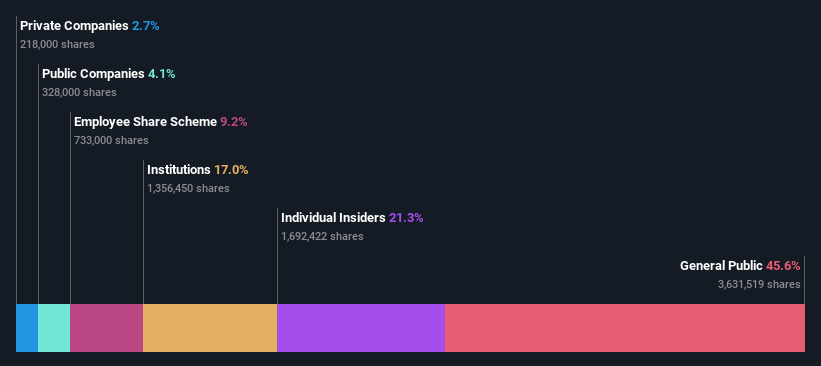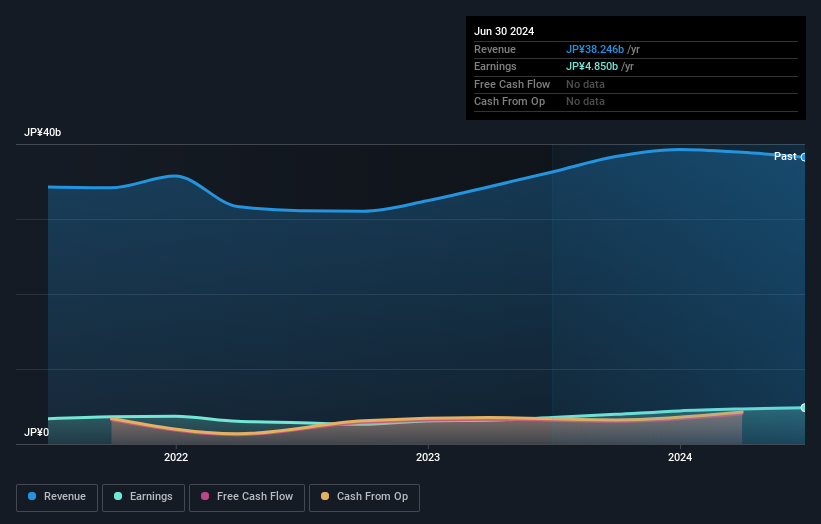Retail investors invested in Nihon Dengi Co., Ltd. (TSE:1723) up 11% last week, insiders too were rewarded

Key Insights
- The considerable ownership by retail investors in Nihon Dengi indicates that they collectively have a greater say in management and business strategy
- A total of 10 investors have a majority stake in the company with 50% ownership
- 21% of Nihon Dengi is held by insiders
If you want to know who really controls Nihon Dengi Co., Ltd. (TSE:1723), then you'll have to look at the makeup of its share registry. We can see that retail investors own the lion's share in the company with 46% ownership. That is, the group stands to benefit the most if the stock rises (or lose the most if there is a downturn).
Retail investors gained the most after market cap touched JP¥49b last week, while insiders who own 21% also benefitted.
Let's take a closer look to see what the different types of shareholders can tell us about Nihon Dengi.
Check out our latest analysis for Nihon Dengi

What Does The Institutional Ownership Tell Us About Nihon Dengi?
Institutions typically measure themselves against a benchmark when reporting to their own investors, so they often become more enthusiastic about a stock once it's included in a major index. We would expect most companies to have some institutions on the register, especially if they are growing.
We can see that Nihon Dengi does have institutional investors; and they hold a good portion of the company's stock. This implies the analysts working for those institutions have looked at the stock and they like it. But just like anyone else, they could be wrong. If multiple institutions change their view on a stock at the same time, you could see the share price drop fast. It's therefore worth looking at Nihon Dengi's earnings history below. Of course, the future is what really matters.

Hedge funds don't have many shares in Nihon Dengi. Our data shows that Nihondengi Co. Ltd., ESOP is the largest shareholder with 9.2% of shares outstanding. In comparison, the second and third largest shareholders hold about 8.1% and 6.6% of the stock. Ryosuke Shimada, who is the third-largest shareholder, also happens to hold the title of Member of the Board of Directors.
We also observed that the top 10 shareholders account for more than half of the share register, with a few smaller shareholders to balance the interests of the larger ones to a certain extent.
While studying institutional ownership for a company can add value to your research, it is also a good practice to research analyst recommendations to get a deeper understand of a stock's expected performance. Our information suggests that there isn't any analyst coverage of the stock, so it is probably little known.
Insider Ownership Of Nihon Dengi
The definition of company insiders can be subjective and does vary between jurisdictions. Our data reflects individual insiders, capturing board members at the very least. Management ultimately answers to the board. However, it is not uncommon for managers to be executive board members, especially if they are a founder or the CEO.
Most consider insider ownership a positive because it can indicate the board is well aligned with other shareholders. However, on some occasions too much power is concentrated within this group.
It seems insiders own a significant proportion of Nihon Dengi Co., Ltd.. Insiders own JP¥10b worth of shares in the JP¥49b company. We would say this shows alignment with shareholders, but it is worth noting that the company is still quite small; some insiders may have founded the business. You can click here to see if those insiders have been buying or selling.
General Public Ownership
The general public-- including retail investors -- own 46% stake in the company, and hence can't easily be ignored. While this size of ownership may not be enough to sway a policy decision in their favour, they can still make a collective impact on company policies.
Public Company Ownership
We can see that public companies hold 4.1% of the Nihon Dengi shares on issue. We can't be certain but it is quite possible this is a strategic stake. The businesses may be similar, or work together.
Next Steps:
While it is well worth considering the different groups that own a company, there are other factors that are even more important. Case in point: We've spotted 1 warning sign for Nihon Dengi you should be aware of.
Of course this may not be the best stock to buy. So take a peek at this free free list of interesting companies.
NB: Figures in this article are calculated using data from the last twelve months, which refer to the 12-month period ending on the last date of the month the financial statement is dated. This may not be consistent with full year annual report figures.
Valuation is complex, but we're here to simplify it.
Discover if Nihon Dengi might be undervalued or overvalued with our detailed analysis, featuring fair value estimates, potential risks, dividends, insider trades, and its financial condition.
Access Free AnalysisHave feedback on this article? Concerned about the content? Get in touch with us directly. Alternatively, email editorial-team (at) simplywallst.com.
This article by Simply Wall St is general in nature. We provide commentary based on historical data and analyst forecasts only using an unbiased methodology and our articles are not intended to be financial advice. It does not constitute a recommendation to buy or sell any stock, and does not take account of your objectives, or your financial situation. We aim to bring you long-term focused analysis driven by fundamental data. Note that our analysis may not factor in the latest price-sensitive company announcements or qualitative material. Simply Wall St has no position in any stocks mentioned.
About TSE:1723
Flawless balance sheet with solid track record.


